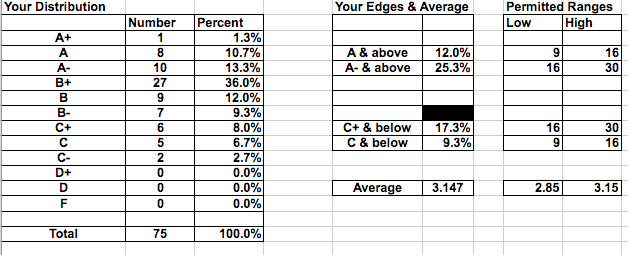Hello everyone. I apologize for interrupting your summer vacations with this note. I have submitted grades for Property II. I am very proud of all of you. On the whole, you nailed it. I put together really difficult fact patterns that were quite open-ended, with the intent that there would be many, many, many correct answers. I thought I had considered all the possible answers, but several of you came up with things I didn’t even think of. Well done.
Additionally, many of you incorporated various concepts we talked about in class that were not in the textbook (such as the Coase Theorem, various constitutional concepts, etc.).
Finally, despite all of your concerns, almost every single one of you managed to completely answer the question within the word limit. In other words, the differences between the A, B, and C was not due to an inability to write within the word limits.
You can download the exam here: Property2-Exam-Blackman-Spring2013. There was one small typo. In part 3 of question 1, I accidentally wrote “Gunston intervened.” I meant to write “Gayson intervened.” About 95% of the test-takers figured out what I meant, and I did not penalize those who missed it.
The Grades
First year classe are subject to the school’s mandatory grading curve (see p. 84 of the handbook):
grades assigned in classes of 40 or more students shall conform to a mandatory grading distribution. That distribution provides for a required 9-16 percent for A+/A, a required 16-30 percent for A+/A/A-; a required 16-30 percent for C+/C/C-/D+/D/F; and a required 9-16 percent for C/C-/D+/D/F. The class average shall be 2.85-3.15.
I think you will find that I maximized the grades here. I approached the upper limits of the grades allowed above an A-, and approached the lower limits of grades below C+. In addition, the class average was very close to the upper limit (3.15). In other words, there were more As than Cs, and the class averages were quite high.
Here is the full breakdown.
- Average: 3.147
- A and above -12.0%
- A- and above – 25.3%
- C+ and below: 17.3%
- C and below: 9.3%

Thank you all for a great semester.
